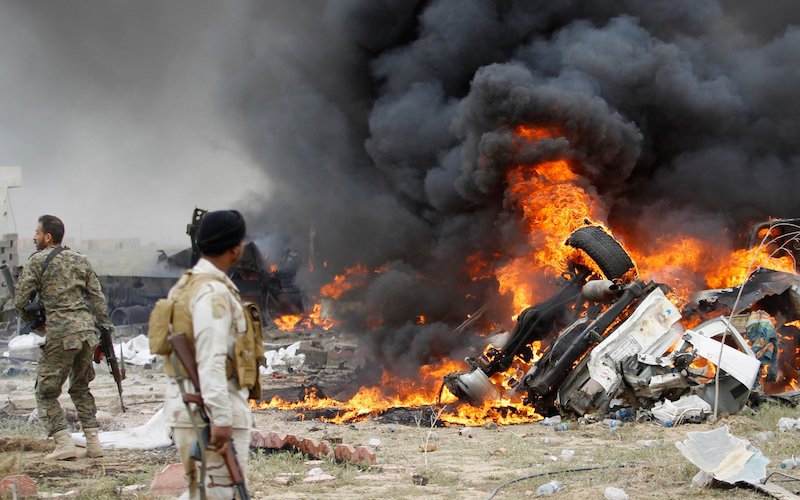
Mideast Policy Advisors Needed
The international community is wondering why the United States has moved so slowly against radical Islamist groups like Islamic State (IS) that are destabilizing much of the Middle East and parts of Africa. Battle-hardened rebels have been waiting for military assistance from the U.S. to attack IS strongholds in Syria. The recent resignation of General John Allen leaves a major void in the U.S. military strategy to support the rebel groups. Reportedly, Allen did not receive the necessary authority for action against radical Islamists which has allowed their rapid expansion to continue throughout the region.
In Afghanistan the Taliban has affiliated with the Islamic State despite the 10,000 U.S. peacekeeping forces there and the new president, Ashraf Ghani, has not been able to bring peace, as terrorist attacks continue daily.
In Iraq stability had started to take hold despite former Prime Minister Nouri al-Maliki, a Shiite, not being able to unify the religious and ethnic factions, which were excluded from the governing process. Prime Minister Haider al-Abadi, another Shiite, is attempting to broaden the government with Sunni and Kurdish members. The instability continues since the poorly trained Iraqi army is no match against the more powerful IS fighters.
After the U.S. invasion in Iraq in 2003 Abu Bakr al-Baghdadi became a member of al-Qaeda. In 2005 he was imprisoned in Camp Bucca until 2009, when he was released “as a person of no further interest”–an unwise decision.
The U.S. troop withdrawal in 2011 opened the door for IS, the outgrowth of the earlier al-Qaeda terrorist group, under the leadership of al-Baghdadi.
They have undertaken terrorist attacks throughout the country killing thousands of people. IS has also injected itself into the civil war in Syria. They have taken over numerous towns along the Iraq-Syria border declaring a caliphate in 2014 ruled under Sharia law. Thousands of people have been trapped in the path of IS destruction, while the U.S. and its allies have done little to stop the carnage.
The U.S. cannot become the world’s peacekeeper; however we can insist that neighboring Arab countries use their military to fight Islamic State. After all IS is in their backyard, and if the monarchies do not act fast they may well face radical Islamists in their own countries.
In North Africa and the Arabian Peninsula the U.S. supported regime change by helping to depose Muammar Gaddafi in Libya, Zine El Abidine Ben Ali in Tunisia, Hosni Mubarak in Egypt and Ali Abdullah Saleh in Yemen, opened the door to radical Islamists who took advantage of the destabilization. The Islamic State now is affiliated with Ansar al-Sharia in Libya, al-Qaeda in the Arabian Peninsula (AQAP) in Yemen and al-Qaeda in the Islamic Maghreb (AQIM) in West Africa.
The U.S. underestimated the vacuum that followed the regime change. Today the new leaders are being undermined, with Libya falling into a power struggle between rebel forces and Islamist militias vying for power. Gaddafi predicted that if he were ‘taken-out’ al-Qaeda would take over.
In Egypt the U.S. supported Mohamed Morsi as president in 2012, a Muslim Brotherhood leader who was deposed a year later for his brutal leadership style and institution of Sharia law. The Muslim Brotherhood continues to undermine the new regime with its mission to create an Islamic State. The Muslim Brotherhood has operations in 70 countries and is currently involved in Syria’s civil war supporting radical Islamists.
In Tunisia President Beji Caid Essebsi is under siege by Islamists trained in Libya who bring back their radical ideology. In 2015 the Islamists gunned down 60 tourists in Tunis, killed 38 people at a tourist hotel and 22 people at the Bardo National Museum. “This is a war against Tunisia,” said Kamel Jendoubi, head of a government task force. “It’s not just about our tourism, or our economy, but Tunisian democracy.”
In Yemen the AQAP controls much of the southern part of the country. In the north Houthi tribal fighters, supported by Iran, have captured the capital of Sanaa forcing the U.S. backed leader, Abd Rabbuh Mansur Hadi, to resign. Neighboring Saudi Arabia has been drawn into the battle attacking the Houthi rebels to dislodge them from the capital.
The fallout from the Arab Spring reached the Sahel region of sub-Saharan Africa, where Islamists overran northern Mali in 2012. Driven out by French forces, the AQIM is still in the region undertaking terrorist attacks. In neighboring Burkina Faso an uprising in 2014 forced President Blaise Compaoré to flee the country. A recent military coup against the interim government further destabilized the country, although these leaders have recently been allowed to return to power. The AQIM affiliated with IS however could further destabilize this Muslim country.
In Nigeria IS has affiliated with Boko Haram, which has been responsible for killing thousands of people and kidnapping hundreds of school children. Boko Haram declared a caliphate in the northern region. In Somalia al-Shabaab Islamists were weakened by the UN African Mission in Somalia (AMISOM), before recently joining forces with IS.
To add to the concern, young Muslim men continue to be indoctrinated by radical preachers around the world and are joining the ranks of IS and other Islamist groups in Africa and the Middle East.
With Syria inching closer to falling under the control of IS, Russia recently sent troops to strengthen Bashar al-Assad’s government. The U.S. spent over four years supporting rebel opposition groups, without finding a viable leader who could unify the country. The U.S. has been steadfast in its belief that al-Assad ‘had to go,’ even without an endgame plan. Syria is a complex country, with numerous ethnic, religious and cultural factions, making it difficult to find a leader who can bring peace to the country. Meanwhile IS and al-Qaeda affiliates are decimating the country.
The U.S. option now is to join forces with two adversaries supporting al-Assad, Russia and Iran, if there is any hope of saving Syria.
On September 20th an AP headline read, “Kerry: Assad could stay in power for a time.” Secretary of State John Kerry said “the U.S. could accept a resolution to the civil war that allows President Bashar Assad to remain in power for an unspecified time.” It is important that the U.S. develop a timely plan to help defeat IS and seek a political resolution relative to al-Assad.
The U.S. policy needs to encourage Arab monarchies to adopt Morocco’s strict policy of uniformity in Islamic education that avoids radical indoctrination and hatred which leads to the recruitment of young jihadists. Morocco is a shining example of being the first Arab country to successfully become a democracy.
The White House needs moderate Islamic advisors, not affiliated with any radical Islamist movement. One such example is Ahmed Chara, a writer and expert on Morocco and North Africa. He sits on the Board of the Foreign Policy Research Institute and Center for Strategic and International Studies in Washington. The U.S. policy needs to engage more with moderate Muslims. At the same time U.S. policy needs to prevent radical Islamists from undertaking terrorist attacks against Americans worldwide.

